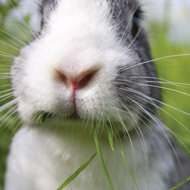
Can more be done to improve owner awareness of rabbit needs?
Rabbits are the third most popular pet in Britain, but sadly they remain one of the country's most neglected domestic animals. A recent PDSA Animal Well-being Report revealed that the welfare needs of many pet rabbits in the UK are not being met. Many live alone or with unsuitable companions, some lack access to outside areas, and many are fearful of loud noises or experience anxiety when their owners handle them.
It is hoped that findings from this report will help to develop education resources to improve rabbit welfare – and clearly more education is needed – but a quick search online already brings up a wealth of information for rabbit owners. It seems the problem is not about producing the information, it's about making sure the message is getting through.
Speaking on rabbit welfare at the BVNA Congress last October, animal behaviour specialist Dr Claire Corridan said that education is 'essential' and the only way to get the message across is to talk to potential owners before they actually acquire the animal. One way this is being achieved is through Rabbit Awareness Week (RAW).
RAW springs into action again this May, with the sole aim of educating people about responsible rabbit ownership. In 2014, almost 3,000 vet practices signed up to the campaign, pledging to offer free rabbit health checks throughout the week. This year, RAW hopes to increase the number of practices signing up and will be extending the week to a month.
As well as benefitting rabbits, getting involved with RAW can bring many benefits to the veterinary practice. Indeed, one veterinary surgery in Edgemore, North Yorkshire, has seen a 60 per cent increase in the number of rabbit clients since they joined the initiative in 2009. Not only have their client numbers increased, but they also feel the initiative has helped them to focus and improve on the service they already provide to rabbits and their owners.
Senior veterinary nurse, Anna Marsden, said: “I would most definitely recommend all small animal practices to support RAW. We should all make sure that we do all we can for our 'fibrevore' friends and RAW is a good way to do so. It is also a good way to interact with rabbit clients (through running different promotions and activities), bringing them into practice."
Anna believes that signing up to the initiative also encourages vets and nurses to undertake more rabbit CPD, so that they are able to offer the best care available to rabbits in practice.
Retailer charter
Pet shops also play an extremely valuable role in educating people about their responsibilities. However, staff might not have the knowledge necessary to give new owners comprehensive and accurate information about rabbit care. Despite good intentions, customers can be told misleading information (for example, rabbits fight and should be kept alone). The shop might also only sell a basic range of hutches, so the owner buys what is there, believing it to be suitable.
The Rabbit Welfare Association Fund's retailer charter helps to address these issues. It is an initiative whereby the retailer agrees not to sell any hutch smaller that 4ft x 2ft x 2ft and include a 6ft x 2ft x 2ft hutch in their range. As a member of the initiative, the retailer receives a range of educational leaflets which are free of charge and designed to be given at the point of sale.
Like the RAW initiative, signing up to the charter doesn't just benefit rabbits, it also benefits the business too. Not only does it mean that the customer is more likely to purchase two rabbits, but it can also lead to greater sales of bedding, toys and food. Furthermore, if a rabbit's welfare needs are met from the very start, they will live a longer, happier life – meaning a longer-term customer of food and accessories!
Pet shops educating customers before they take home a pet, or vet practices reminding clients of their responsibility when they come into surgery, is essential to making sure that the needs of rabbits are being met. With rabbit diets and treatments constantly improving and changing, hopefully more veterinary staff will be encouraged to keep up with rabbit CPD and more pet shops will see the importance of making sure their staff are fully trained. Not only will this benefit the animal, but it will be great for business too.



 HMRC has invited feedback to its communications regarding the employment status of locum vets and vet nurses.
HMRC has invited feedback to its communications regarding the employment status of locum vets and vet nurses.